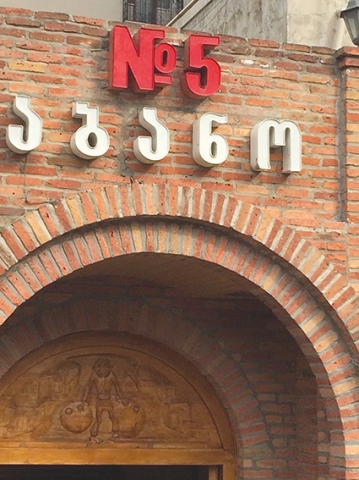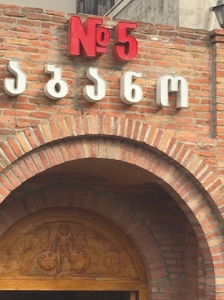Maidan Square and Sulfur Baths
Her scrawny little body can hardly be seen in the sulfur steam and her skin is blushed. Khatuna Jafarova is an ethnic Azerbaijani woman from Rustavi. She is 73 and habitually comes to Tbilisi to wash in the sulfur baths.
“Sulfur water has so many healing powers that no medicine can compete with it. Look at my thick hair! This water heals my knee pains. My people work here; so I come here, talk with them and share my problems with them,” Khatuna says.
Maidan Square in the center of Tbilisi is famous for its sulfur baths. Many inhabitants of the Maidan area are ethnic Azerbaijanis.
You can see steaming chimneys, which look like mosques, poking up from the red brick domes of the numbered bath houses. Nearby, men argue over backgammon and domino boards. A statue of the late President of Azerbaijan, Heydar Aliyev, stands overlooking security officers of the Azerbaijani oil company SOCAR who guard the territory of Maidan Park.
When you enter the 5th Bath House you will see a corridor heading in two directions: one for women, one for men. In both parts the communal baths are more crowded. People pay 3 Lari for a communal bath and 30 Lari for a private room or 80 Lari for a VIP bathroom. The dressing room is watched over by an ethnic Armenian woman. She says she has been working in the bath house for eight years and gets on well with her ethnic Azerbaijani colleagues. “I’ve made friends with many Azerbaijani people here. I’m a citizen of Georgia. I think problems are a political issue. We, ordinary people, should have good relations.”
Sulfur-bath attendant Marina Aliyeva stands at the entrance advising new-comers to get soaked with soap and shampoo. Then she grabs water with vinegar and scrub and heads to the communal room. She said the vinegar easily takes lime and microbes out, “We have a difficult job but I got used with it and don’t get easily tired. I’ve been working here for 11 years. People say sulfur water smells bad but I’ve already got used to it and cannot smell it. Most bath attendants are Azerbaijani people. Azeri men are working in the men’s part. Our daily salary is 5 GEL. I have 4-5 clients per day. In summer we have more tourists. I work every third day and at the end of month I don’t get much salary but since there is no other option, I have to live with it.”
Another female bath attendant, who did not say her name, said ethnic Azerbaijani employees do not have permanent salaries in the bath. Only Georgian employees have stable salaries. “I don’t know Georgian and Russian language well. I asked them several times to give me a job at the cash desk but they said no. Only Georgian employees get stable salaries. They don’t allow us to work in the better-paid positions. Neither we nor Armenians.”
Hasan Allahverdiev, who lives near the sulfur baths, said the bath is not only a working place for local Azerbaijani people; it is an indivisible part of their daily life. “In the past, Azerbaijani people used to come here more frequently. Not everybody had a bathroom in their house and even residents of remote villages used to come here. Maidan was place where Azerbaijani people gathered. It is part of our culture. Going to the bath is a tradition. Today, the Azerbaijani people rarely come here; mostly tourists come here who are curious about the sulfur baths.”
Khatuna Jafarova walks slowly back home from the bath. She believes if she takes a bath in the sulfur water every week, she will stay healthy for the remainder of her life.
This article was prepared in the frame of a project implemented by the Human Rights House Tbilisi with financial support from the Embassy of the Kingdom of the Netherlands in Tbilisi. Human Rights House Tbilisi is responsible for the content of the article and the views in it do not necessarily express the views of the Embassy of the Kingdom of the Netherlands.
Gulnur Kazimova












